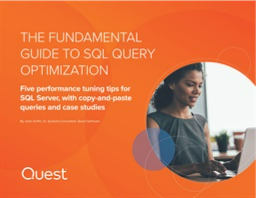The Fundamental Guide to SQL Query Optimization
SQL query optimization is both an art and a science, undertaken by intrepid database professionals who relish the challenge of identifying and tuning queries that are impacting performance. It can be difficult, but it's certainly not impossible.
This e-book provides a reliable method for analyzing and addressing performance issues in your SQL Server environment. The SQL query tuning tips presented use detailed, real-world examples to demonstrate how applying them can make a quantitative difference in performance. No matter your level of expertise, this is an indispensable resource for anyone responsible for SQL query optimization.
The five SQL query tuning tips presented in this guide offer detailed, copy-and-paste examples showing their application and results.
Learn how to:
Read More
By submitting this form you agree to Quest UK contacting you with marketing-related emails or by telephone. You may unsubscribe at any time. Quest UK web sites and communications are subject to their Privacy Notice.
By requesting this resource you agree to our terms of use. All data is protected by our Privacy Notice. If you have any further questions please email dataprotection@techpublishhub.com
Related Categories: Analytics, Artificial Intelligence, Big Data, Cloud Computing, Data Analytics, Data Center, Data Centers, Databases, Firewall, Infrastructure Management, Predictive Analytics, SDDC, Server, Storage, Virtualization, Visual Analytics, VPN


More resources from Quest UK

Upgrading Quest Toad for Greater Security
IT administrators are right to draw a line in the sand when it comes to the software they install – and allow their users to install – on their...

Overcome Database Indexing Challenges
Overcome your database indexing challenges – read this MSSQLTips white paper today
By properly using indexing, you'll make your databases r...

New Best Practices Using the Latest Cloud and...
Multiple backup solutions, clouds, and cloud storage tiers can all lead to escalating cloud storage costs and complexity. These, in turn, hamper an...